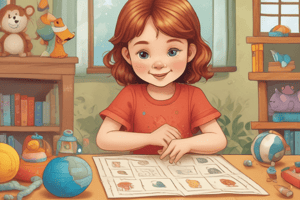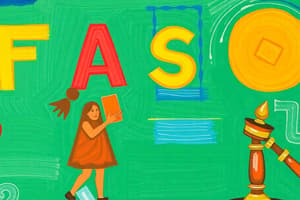Podcast
Questions and Answers
What is the primary medium for learning in the Schools of Reggio Emilia?
What is the primary medium for learning in the Schools of Reggio Emilia?
- Science
- Art (correct)
- Mathematics
- Music
In the Reggio Emilia approach, parents are considered as partners in the educational process.
In the Reggio Emilia approach, parents are considered as partners in the educational process.
True (A)
Who founded the Bank Street Developmental Interaction Model?
Who founded the Bank Street Developmental Interaction Model?
Lucy Sprague Mitchell
The Reggio Emilia approach views the child as the __________ in the educational process.
The Reggio Emilia approach views the child as the __________ in the educational process.
Match the following fundamentals of the Reggio Emilia approach with their descriptions:
Match the following fundamentals of the Reggio Emilia approach with their descriptions:
Which educational ideology views the child as a 'philosopher or scientist-poet'?
Which educational ideology views the child as a 'philosopher or scientist-poet'?
In Cultural Transmission, the teacher is seen as a facilitator.
In Cultural Transmission, the teacher is seen as a facilitator.
Who is one of the proponents of Romanticism?
Who is one of the proponents of Romanticism?
The 'plan-do-review' process is a key feature of the __________ model.
The 'plan-do-review' process is a key feature of the __________ model.
What is the main focus of the Romanticism educational ideology?
What is the main focus of the Romanticism educational ideology?
Match the educational ideologies with their distinctive features:
Match the educational ideologies with their distinctive features:
Active learning in small groups is a feature of the High Scope model.
Active learning in small groups is a feature of the High Scope model.
What is the primary orientation of Progressivism in education?
What is the primary orientation of Progressivism in education?
What is one of the key principles of Waldorf Schools?
What is one of the key principles of Waldorf Schools?
Montessori Schools emphasize play-based learning in their curriculum.
Montessori Schools emphasize play-based learning in their curriculum.
Describe the approach to materials in Montessori Schools.
Describe the approach to materials in Montessori Schools.
Waldorf Schools put a strong emphasis on ________________ elements based on the cycles of life and nature.
Waldorf Schools put a strong emphasis on ________________ elements based on the cycles of life and nature.
Match the following educational philosophies with their characteristics:
Match the following educational philosophies with their characteristics:
Which of the following is a practice in Waldorf Schools?
Which of the following is a practice in Waldorf Schools?
Montessori Schools allow children to choose their own activities.
Montessori Schools allow children to choose their own activities.
What is one defining feature of Waldorf Schools' curriculum?
What is one defining feature of Waldorf Schools' curriculum?
Flashcards
High Scope Classroom
High Scope Classroom
A type of preschool program that emphasizes active learning and child-directed activities.
Bank Street Approach
Bank Street Approach
An educational philosophy that emphasizes play-based learning and integrated curriculum, rooted in social studies.
Reggio Emilia Approach
Reggio Emilia Approach
A child-centered educational philosophy that emphasizes project-based learning, collaboration, and artistic expression.
The Child as Protagonist
The Child as Protagonist
Signup and view all the flashcards
The Environment as the Third Teacher
The Environment as the Third Teacher
Signup and view all the flashcards
What is the metaphor for a child in Romanticism?
What is the metaphor for a child in Romanticism?
Signup and view all the flashcards
How does learning happen in Cultural Transmission?
How does learning happen in Cultural Transmission?
Signup and view all the flashcards
Why is the teacher a facilitator in Progressivism?
Why is the teacher a facilitator in Progressivism?
Signup and view all the flashcards
Define 'plan-do-review' process.
Define 'plan-do-review' process.
Signup and view all the flashcards
What is the core philosophy behind High Scope?
What is the core philosophy behind High Scope?
Signup and view all the flashcards
What is the goal of High Scope?
What is the goal of High Scope?
Signup and view all the flashcards
How does High Scope integrate children with special needs?
How does High Scope integrate children with special needs?
Signup and view all the flashcards
Why is interaction with the environment important for children in High Scope?
Why is interaction with the environment important for children in High Scope?
Signup and view all the flashcards
Waldorf School
Waldorf School
Signup and view all the flashcards
Waldorf Curriculum
Waldorf Curriculum
Signup and view all the flashcards
Montessori School
Montessori School
Signup and view all the flashcards
Montessori Curriculum
Montessori Curriculum
Signup and view all the flashcards
Waldorf vs. Montessori
Waldorf vs. Montessori
Signup and view all the flashcards
Common Ground: Holistic Development
Common Ground: Holistic Development
Signup and view all the flashcards
Study Notes
Preschool Programs and Models
- Preschool programs reflect different educational philosophies, each with distinct approaches to learning and development.
- These philosophies impact the child's role, learning process, and the teacher's role in the classroom.
- Curriculum models vary in their emphasis, activities, and environmental features.
Distinctive Features of Educational Ideologies
-
Romanticism:
- Views the child as a plant, with the teacher as a gardener.
- Emphasizes the child's natural development and exploration.
- Learning comes from nurturing the environment to support a child's blooming.
- Curriculum promotes a child's freedom to explore.
- Proponents include Freud, Montessori, Froebel, and Rousseau.
-
Cultural-Transmission:
- Sees the child as a machine, requiring passive learning.
- Favors a teacher as a drill-master, often using stimulus-response principles.
- Relies heavily on rewards and punishments, repetition, and correct responses.
- Emphasizes conformity and uniformity, focusing less on individual development.
- Proponents include Pavlov, Skinner, Thorndike, Watson, and Locke.
-
Progressivism:
- Views the child as a philosopher or scientist, actively involved in learning and developing their own understanding.
- Emphasizes the teacher's role as a facilitator, helping the child interact with the environment.
- Learning develops from the child's interaction with the environment.
- Focuses on cognitive and developmental aspects of learning.
- Advocates for child-centered learning, through exploration, interaction, and observation.
- Proponents include Dewey and Piaget.
High Scope: Cognitively Oriented Model
- Established in 1970 by David P. Weikart, this model focuses on the cognitive development of a child.
- The model emphasizes a planned curriculum and the importance of the learning environment to promote learning.
- The curriculum promotes a "plan-do-review" process and emphasizes active learning, within a small-group setting.
- This model also actively attempts to integrate children with special needs.
- Children learn from interacting with their environment, with materials and people.
- Portfolio assessment is valued, including initiative, creativity, social interaction, and engagement with the art, music, movement, language and literacy, logic and mathematics.
Bank Street: Developmental Interaction Model
- Founded by Lucy Sprague Mitchell in 1916, it emphasizes a play-based approach to learning.
- Learning takes place through active learning centers.
- The curriculum is deeply rooted in social studies.
The Schools of Reggio Emilia
- Separate programs are available for infants through 6-year-olds.
- The curriculum is integrated and emergent.
- The curriculum includes a project-based approach where art is the primary medium.
- The classroom environments are rich with aesthetically-vibrant materials.
- A strong sense of community is promoted, with the entire community involved including families and fostering mutual support.
- The approach emphasizes the child's role as protagonist, collaborator, communicator, emphasizing their active participation in the learning process.
Waldorf Schools
- Founded by Rudolf Steiner in 1919, they emphasize developing the whole child through the "head, heart, and hands."
- Waldorf schools prioritize play-based learning.
- Curriculum de-emphasizes academics in early schooling.
- They also utilize educational looping where a teacher stays with the same group of students through multiple years.
- The curriculum includes rhythm, elements based on life and nature cycles, and natural materials.
- Materials used are generally natural like wood, cotton, and wool.
- The classroom environments are tailored to nourish the senses.
- Emphasis on practical life activities like cooking, baking, cleaning, sewing, gardening provide hands-on learning experiences.
Montessori Schools
- Focuses on adapting learning to an individual's pace and need, rather than molding the child.
- Curriculum insists on freedom for selecting materials and choosing activities.
- Training of the senses and engagement with practical life issues are also key components.
- Not necessarily play-based; practical life area instead of fantasy is prioritized.
- Materials are often self-correcting, with tactile appeal.
- A sequential learning approach ensures children work at their own pace.
- Child-sized environments are carefully designed.
Studying That Suits You
Use AI to generate personalized quizzes and flashcards to suit your learning preferences.




